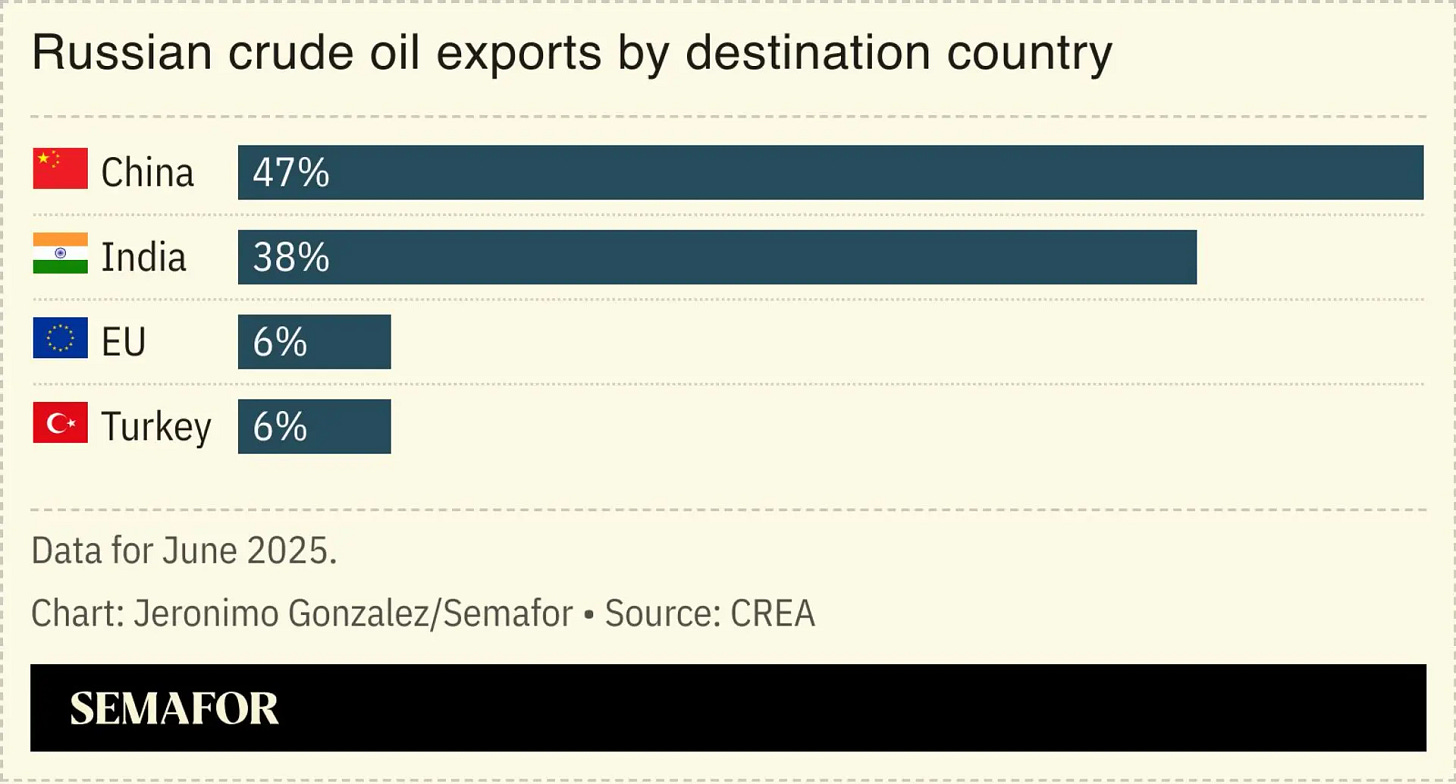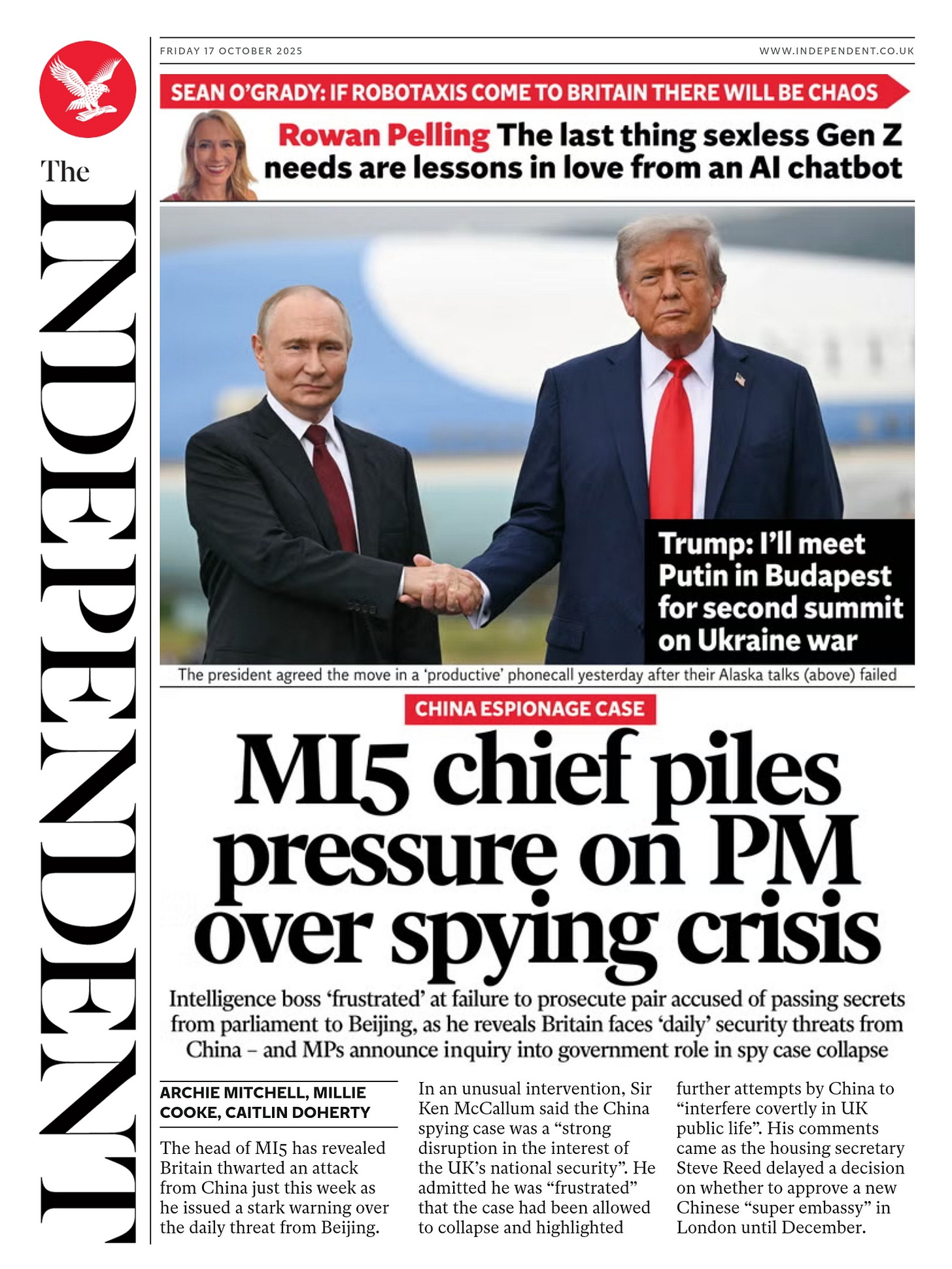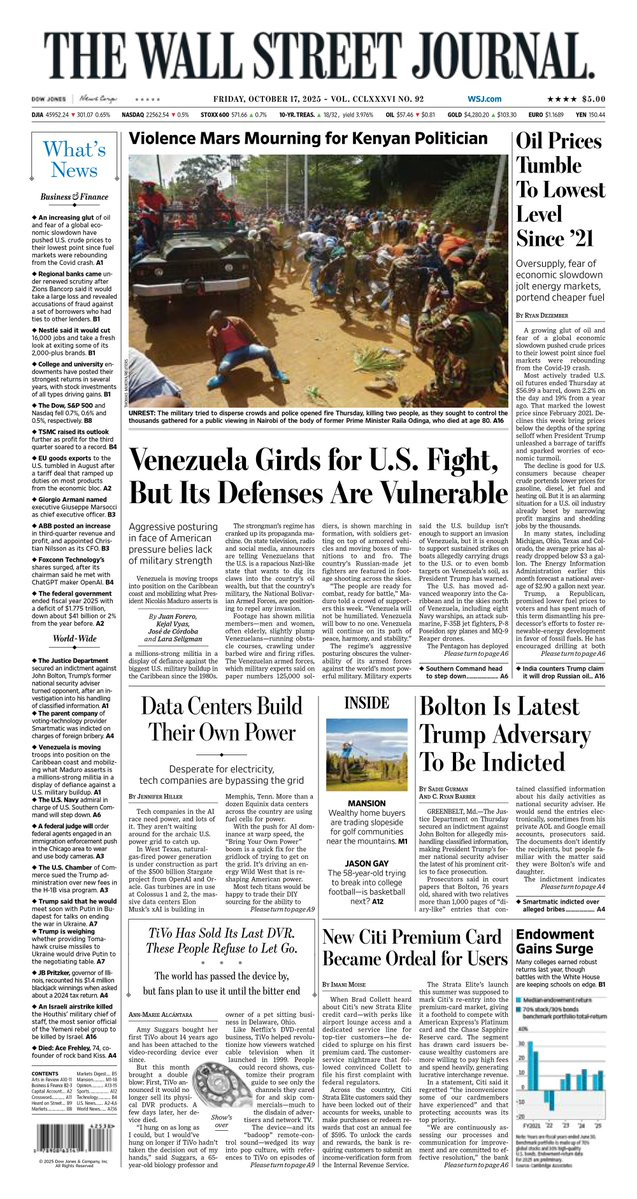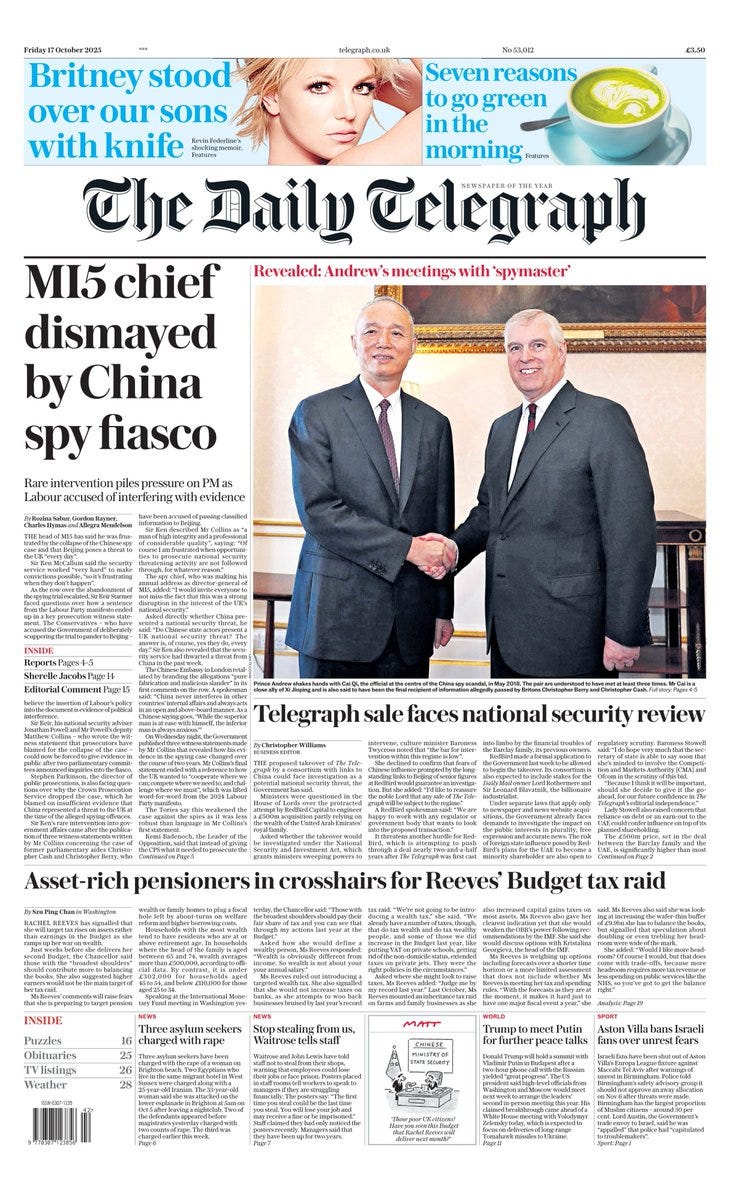Trump Snubs Zelensky’s Tomahawk Plea, Plays the ‘Mediator President’
Ahead of a White House lunch meeting, Trump appears to dismiss missile aid to Ukraine as “escalatory,” praises Putin’s economic vision, and claims credit for “ending eight wars.”
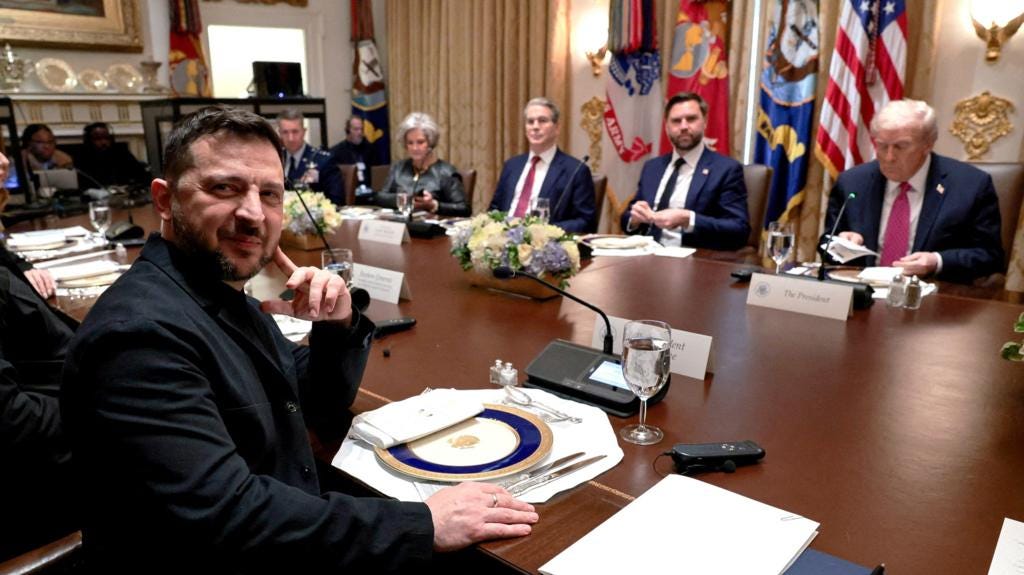
At the White House today, President Volodymyr Zelensky arrived to plead his case for advanced U.S. weaponry, but he found a reluctant partner in Donald Trump. The U.S. president — fresh from a two-and-a-half hour phone call with Vladimir Putin — struck a tone more conciliatory than confrontational, calling the Ukrainian leader “stylish” before stressing that “tremendous bad blood” between Kyiv and Moscow must give way to “long-lasting peace.”
When pressed about supplying Tomahawk cruise missiles, Trump firmly rebuffed the idea, calling them “very powerful, very destructive weapons” that would only “cause many bad things.” He said, “We’d much rather have Ukraine not need Tomahawks… I think we have a good chance [for peace].”
Casting himself once again as “the mediator president”, Trump claimed he had already “solved eight wars” and mused that Putin and Zelensky “will need to meet at some point.” He repeated his long-standing boast of deserving a Nobel Peace Prize. When asked if Putin was stalling, Trump quipped: “I’ve been played by the best of them all my life.”
Zelensky, for his part, tried to remain diplomatic, telling reporters: “I think we are beginning to understand each other,” adding that Trump was “understanding more details of the war.” But for Ukraine, the early messaging from Zelensky’s third meeting with Trump this year was not encouraging: Tomahawks appear to be off the table, and Washington’s enthusiasm for deeper military engagement is fading fast.
Behind the theatrics, Trump appears far more captivated by talk of “amazing economic cooperation” with Russia — even signalling excitement at a fantastical tunnel linking Alaska and the Russian Far East — than by Zelensky’s appeals for deterrence. The optics underscore a striking shift: as the two presidents retreat behind closed doors, Trump’s posture seems aimed at restraining Ukraine’s reach, not expanding it.
***Late breaking news via BBC: Zelensky said (after emerging from the White House) that he and Trump talked about long-range weapons, but both decided not to make any public statements about that conversation. He says this is “because the United States does not want an escalation”. It is unclear if the Ukrainian president means that the weapons are off the table, or if information about the use of missiles will not be discussed publicly.
“Hopefully they won’t need it. Hopefully we’ll be able to get the war over with without thinking about Tomahawks….Tomahawks are a big deal. But one thing I have to say, we want Tomahawks also. We don’t want to be giving away things that we need to protect our country” - Donald Trump
Watch my live interview with BBC World News, where I joined presenter Caitríona Perry from Odesa to discuss today’s meeting between Ukrainian President Volodymyr Zelensky and U.S. President Donald Trump. We unpacked how Trump’s phone call with Vladimir Putin the day before may have reshuffled the diplomatic deck — in ways that could complicate Zelensky’s push for stronger U.S. support.
US President Donald Trump said Indian Prime Minister Narendra Modi had pledged to stop buying oil from Russia, but New Delhi said the two leaders haven’t communicated in recent days. The confusing back-and-forth — reminiscent of an episode earlier this year in which Trump said he spoke to Chinese leader Xi Jinping, an assertion denied by Beijing — underlined persistent tensions between the US and India. Their ties have been upended by Trump’s frustration with Indian purchases of oil from Russia, which Washington argues is helping Moscow fuel its war with Ukraine. “Once again, Donald Trump has made a claim that may not square with facts,” a leading Indian journalist said. Still, “New Delhi has little option but to tread with caution.” - Semafor
A week into the ceasefire, Israel has continued to seal Gaza’s Rafah crossing with Egypt despite repeated international calls to allow in large-scale aid deliveries. Meanwhile, Israeli attacks killed and wounded several Palestinians in northern Gaza. For several days, the United Nations has warned that there has been little progress in aid deliveries into Gaza and that assistance must enter at scale through all border crossings to meet urgent humanitarian needs. Under the deal to end Israel’s genocide, which has killed more than 67,000 Palestinians in two years, Israel was to allow for a surge in aid deliveries. The UN said on Friday that aid convoys were struggling to reach famine-hit areas of northern Gaza due to bombed-out roads and the continued closure of other key routes – Zikim and Beit Hanoon (called Erez in Israel) – into the enclave’s north. The World Food Programme (WFP) said it has brought an average of 560 tonnes of food per day into Gaza since the ceasefire began last week, but the amount is still below what is needed. The UN agency said it has enough food to feed all of Gaza for three months. UN humanitarian affairs chief Tom Fletcher said this week that thousands of aid vehicles would have to enter weekly to tackle widespread malnutrition, displacement, and a collapse of infrastructure. “We’re still below what we need, but we’re getting there … The ceasefire has opened a narrow window of opportunity, and WFP is moving very quickly and swiftly to scale up food assistance,” WFP spokesperson Abeer Etefa told a news briefing in Geneva. As part of the US-brokered ceasefire deal, which calls for their gradual withdrawal, Israeli forces remain in approximately 53 percent of Gaza. “Access to Gaza City and northern Gaza is extremely challenging,” Etefa said, adding that the movement of convoys of wheat flour and ready-to-eat food parcels from the south of the territory was being hampered by broken or blocked roads - Al Jazeera
Prince Andrew said Friday he is giving up his royal title of the Duke of York and other honors after his friendship with sex offender Jeffrey Epstein returned to the headlines. Andrew, younger brother of King Charles III, said in a statement released by Buckingham Palace that “the continued accusations about me distract from the work of His Majesty and the royal family.” “With His Majesty’s agreement, we feel I must now go a step further. I will therefore no longer use my title or the honours which have been conferred upon me,” Andrew said in his statement Friday. “As I have said previously, I vigorously deny the accusations against me.” It’s the latest fall from grace for the 65-year-old prince, who had already stepped down from public life in 2019 over his links to Epstein despite his denials of any wrongdoing. News that he will be ditching his title came in the wake of the release of excerpts of an upcoming posthumous memoir from Virginia Roberts Giuffre, who has alleged she was trafficked by Epstein and had sex with Andrew when she was 17. The memoir is due to be published on Tuesday. Giuffre died by suicide in April at the age of 41. In the memoir, she details alleged encounters with Prince Andrew, who she sued in 2021. Andrew denied her claims and said he didn’t recall having met her - AP


